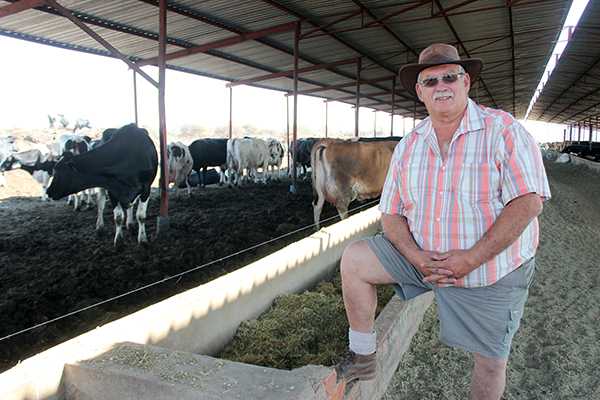De Rust Farm proprietor, Schutter sees huge potential in local dairy farming
The local dairy market is small but there is a huge potential waiting to be tapped, says local dairy milk farmer, Johan Schutter.
Schutter is the owner of De Rust Farm located on the outskirts of Pitsane. Prior to setting up his business in Botswana in 2002, Schutter was a farmer in South Africa and has over 20 years experience.
Speaking in an interview with this publication conducted at his farm, Schutter said farming is the only thing that he has known all his life.
Schutter is one of the few local farmers who call Clover their client, the only processor that sources milk from local farmers. The rest of the processors rely on the South African market. With the current developments, he says local farmers are unable to meet the local milk requirement hence the importation of milk from South Africa.
He says that time is now for other processors to start sourcing milk from local farmers, something that will go a long way in tilting the scales in favour of local farmers. “The industry will grow faster as it will have more buyers,” he says pointing out that there will be no need to import milk from South Africa.
According to Schutter, this will also give farmers leverage when it comes to negotiating prices. “One of the challenges that we are facing right now is the fact that processors determine the prices, and it is not enough. This also explains why other players are unable to come on board,” says Schutter.
But the same cannot be said for South Africa where farmers determine the prices. “They dictate the prices and can supply at cheap prices,” he says. He believes that as soon as there is a market, farmers can now benefit from loans through CEDA and banks, as they will be able to finance their loans.
De Rust Farm is every farmer’s dream. A herd of dairy cows are busy munching and crunching on their feed in his farm. Udders looking full and ready to pop, the herd is minding its own business and continues to eat and pays no attention to what is happening around.
This is despite the fact that the herd has already been milked at the crack of dawn, and will be milked again in the afternoon. The herd, consisting of Friesians, Guernseys, and Brown Swiss breeds, is part of the 240 cows that are in production at the De Rust Farm. The 240 cows form part of his 600 herd.
Between the 240 cows in production, some produce as much as 45litres daily and others 25litres. “I can’t complain about the yield,” Schutter explains. At the moment, he has
young heifers that are coming into production and by the end of the year, he is planning to have 400 cows in production. On average, he produces 6000 litres of milk daily, and with the new heifers coming into production, will increase to 10 000litres.
A statement from Ministry of Agricultural Development and Food Security indicates that milk production has showed tremendous improvement in comparison to previous years. The statement points out that the national demand for milk stands at 65 million litres. From April 2016 to March 2017, the statement says 6, 216, 813 litres of milk which translates to 96 percent of the target and 9.6 percent of the annual demand, were produced in comparison to 3, 698, 578 litres produced in April 2015 to March 2016.
“However, the productivity is still below the target of 20litres/cow/day,” the statement says.
A 365 days a year job, Schutter says challenges that they face daily as dairy farmers include water, shortage of land and the fact that most of the farmers are on a zero grazing system. This means parting away with hefty amounts of money to buy feeds from South Africa.
“Farming is an intensive business, which is also expensive to run,” he explains. He says that government assistance with the 18 months of subsidy feeds as part of the drought relief has really gone a long way in cushioning the burden of buying feeds. Had this not been the case, some of them would have closed shop as the drought was really bad, he concedes.
In total, he has a staff of 28 in his farm, and they fulfil a number of roles that range from milking, feeding and doing casual work. Considering that the business of milking cows is very sensitive and needs careful watch, he explains that everything must run as smoothly as possible, and that staff hygiene and the health of the cows play a crucial role in averting disasters.
His advice to would-be farmers is to learn more about business and do tonnes of research before venturing into the business. “They should also make sure that they are not far from roads and electricity,” he advises.
Besides the dairy milk business, he is also selling Kalahari Red goats and white Dorpers sheep. He also sells bull calves. A week-old calf sells for P250.






